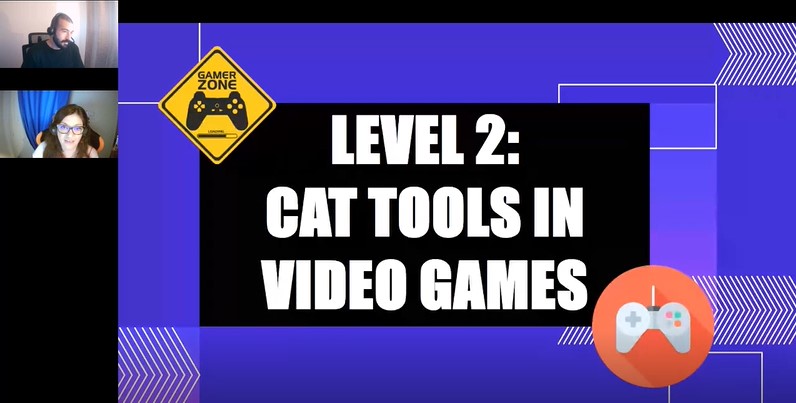The second Video Game Localization Meetup took place on July 29. Sara Rodríguez and Guillermo Umpiérrez from the Terra Localizations team dove into how CAT tools are used within the video game localization industry and gave attendees some tips and at the end one lucky member won a memoQ license.
Like last time, there was a myriad of questions and our speakers couldn't answer all of them. But don't worry, we'll get to them right here and now:

- Is it possible to use Context Note to see who is the speaker in Trados Studio?
A: Yes, it is possible to add columns as comments in Trados Studio as well. What you have to do is go to "Project Settings" and choose the file type "Bilingual Excel" and, as you can see in the screenshot below, you can choose which columns of your Excel file you want to add as a comment. You can add as many as you want.
- One of my biggest questions about a CAT tool has been "Does it work on a Mac?" and in 90 of cases - no, it doesn't.
A: It is true that CAT tools are not yet ready for compatibility with Mac, that is why most of them today offer a web or online version from which you can access no matter what operating system you are using. The other option is to install the windows desktop on your Mac.
Please check some CAT tools' online versions:
– MemoQ WebTrans
– Google Translator Toolkit
– Lilt (w/ adaptive MT)
– MateCat
– Memsource Cloud
– Transifex
– WebTransit
– wordbee
– Wordfast Anywhere
– XTM Cloud
– Lokalise
– crossWeb
- Could you share with us one or two really useful scripts you are using and how are you doing that? Thank you so much.
A: If you need help with any particular process that we talked about in the chat, feel free to join the Terra Localizations Discord server and ask us directly so we can help you.
We use mostly Powershell scripts within the team since they allow us a great deal of scalability and they are fairly easy to customize, even without the necessary technical knowledge required to write them from scratch.
For instance, we use Powershell scripts to change several file names simultaneously, which use the following syntax:
Get-ChildItem *.extension_of_the_file |Rename-Item -NewName {$_.name -replace 'part_to_be_replaced','new_text'}
Also, if you are trying to change the content within your files and not simply the names, you can use something like this:
(Get-Content *.extension_of_the_file) |
Foreach-Object {$_ -replace 'part_to_be_replaced','new_text'} |
Out-File *.extension_of_the_file
Note that we are using regular expressions on both of these as we use “*” to match any file name with the indicated extension, but you can also write the name of the file you are trying to edit literally if you are trying to edit just one file.
Regarding the how, you’ll need to know at least the fundamentals of programming before you start trying to write your own scripts or even trying to learn a particular language. So start with the basics: Data Flow, Variables, Data Structures and Algorithms, Functions, Syntax and Pseudocode.
- Q: How popular is DéJà Vu nowadays?
A: Déjà Vu is a very popular CAT tool that offers a host of translation memory and terminology management features. It prides itself on a particularly user-friendly and customizable interface and can handle a wide variety of file formats, including Trados and memoQ and it is available with a permanent license.
In the world of video game localization, our experience is that the two most used CAT tools are memoQ and Trados Studio because, as the volume of words of the projects is usually large, we prefer working with online servers. Déjà Vu is a good option for jobs in which you can work offline since, also as we said before, it is compatible with the interchangeable packages of other CAT Tools.
- Any tips on how to get big/AAA video game projects (networking, ProZ.com, applying via website), and how much the luck factor comes into play in getting one?
A: Although luck is an essential factor in everything in life, hard work and knowing how to present yourself and how to train are vital parts to perform any job. And, luckily for you, during our monthly talks we are also going to address the topic of how to put our heads in this industry. So stay tuned for all levels, but especially the last two ones, Level 5 and the Final Boss, that will be focused on this topic.
Did you miss this level or want to watch it again? Head to ProZ.com/TV! It will be available for free for all users until August 19. After that, it will only be available to ProZ.com's Plus subscribers and business members.
Now that you're up to date, why not pre-register for the next Meetup in the series? Level 3, "Terminology Management", will go in-depth on Managing Terms in Game Localization. Verónica and Fiorella will teach you all about Glossaries and Style Guides, what they are and how to make them. After the presentation, there will be live Q&A and networking with peers from all over the world; and we'll be giving away two Trados Studio licenses!

Remember that these next levels are just for ProZ.com paying members. Not a member yet? Upgrade now.
Hope to see you there!


